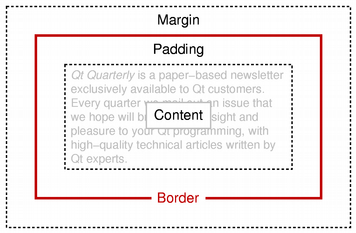
The QTextFrameFormat class provides formatting information for frames in a QTextDocument. More...
| Header: | #include <QTextFrameFormat> |
| CMake: | find_package(Qt6 REQUIRED COMPONENTS Gui)target_link_libraries(mytarget PRIVATE Qt6::Gui) |
| qmake: | QT += gui |
| Inherits: | QTextFormat |
| Inherited By: |
Note: All functions in this class are reentrant.
| enum | BorderStyle { BorderStyle_None, BorderStyle_Dotted, BorderStyle_Dashed, BorderStyle_Solid, BorderStyle_Double, …, BorderStyle_Outset } |
| enum | Position { InFlow, FloatLeft, FloatRight } |
| QTextFrameFormat() | |
| qreal | border() const |
| QBrush | borderBrush() const |
| QTextFrameFormat::BorderStyle | borderStyle() const |
| qreal | bottomMargin() const |
| QTextLength | height() const |
| bool | isValid() const |
| qreal | leftMargin() const |
| qreal | margin() const |
| qreal | padding() const |
| QTextFormat::PageBreakFlags | pageBreakPolicy() const |
| QTextFrameFormat::Position | position() const |
| qreal | rightMargin() const |
| void | setBorder(qreal width) |
| void | setBorderBrush(const QBrush &brush) |
| void | setBorderStyle(QTextFrameFormat::BorderStyle style) |
| void | setBottomMargin(qreal margin) |
| void | setHeight(const QTextLength &height) |
| void | setHeight(qreal height) |
| void | setLeftMargin(qreal margin) |
| void | setMargin(qreal margin) |
| void | setPadding(qreal width) |
| void | setPageBreakPolicy(QTextFormat::PageBreakFlags policy) |
| void | setPosition(QTextFrameFormat::Position policy) |
| void | setRightMargin(qreal margin) |
| void | setTopMargin(qreal margin) |
| void | setWidth(const QTextLength &width) |
| void | setWidth(qreal width) |
| qreal | topMargin() const |
| QTextLength | width() const |
A text frame groups together one or more blocks of text, providing a layer of structure larger than the paragraph. The format of a frame specifies how it is rendered and positioned on the screen. It does not directly specify the behavior of the text formatting within, but provides constraints on the layout of its children.
The frame format defines the width() and height() of the frame on the screen. Each frame can have a border() that surrounds its contents with a rectangular box. The border is surrounded by a margin() around the frame, and the contents of the frame are kept separate from the border by the frame's padding(). This scheme is similar to the box model used by Cascading Style Sheets for HTML pages.

The position() of a frame is set using setPosition() and determines how it is located relative to the surrounding text.
The validity of a QTextFrameFormat object can be determined with the isValid() function.
See also QTextFrame and QTextBlockFormat.
This enum describes different border styles for the text frame.
| Constant | Value |
|---|---|
QTextFrameFormat::BorderStyle_None |
0 |
QTextFrameFormat::BorderStyle_Dotted |
1 |
QTextFrameFormat::BorderStyle_Dashed |
2 |
QTextFrameFormat::BorderStyle_Solid |
3 |
QTextFrameFormat::BorderStyle_Double |
4 |
QTextFrameFormat::BorderStyle_DotDash |
5 |
QTextFrameFormat::BorderStyle_DotDotDash |
6 |
QTextFrameFormat::BorderStyle_Groove |
7 |
QTextFrameFormat::BorderStyle_Ridge |
8 |
QTextFrameFormat::BorderStyle_Inset |
9 |
QTextFrameFormat::BorderStyle_Outset |
10 |
See also borderStyle() and FrameBorderStyle.
This enum describes how a frame is located relative to the surrounding text.
| Constant | Value |
|---|---|
QTextFrameFormat::InFlow |
0 |
QTextFrameFormat::FloatLeft |
1 |
QTextFrameFormat::FloatRight |
2 |
Constructs a text frame format object with the default properties.
Returns the width of the border in pixels.
See also setBorder().
Returns the brush used for the frame's border.
See also setBorderBrush().
Returns the style of the frame's border.
See also setBorderStyle().
Returns the width of the frame's bottom margin in pixels.
See also setBottomMargin().
Returns the height of the frame's border rectangle.
See also setHeight().
Returns true if the format description is valid; otherwise returns false.
Returns the width of the frame's left margin in pixels.
See also setLeftMargin().
Returns the width of the frame's external margin in pixels.
See also setMargin().
Returns the width of the frame's internal padding in pixels.
See also setPadding().
Returns the currently set page break policy for the frame/table. The default is QTextFormat::PageBreak_Auto.
See also setPageBreakPolicy().
Returns the positioning policy for frames with this frame format.
See also setPosition().
Returns the width of the frame's right margin in pixels.
See also setRightMargin().
Sets the width (in pixels) of the frame's border.
See also border().
Sets the brush used for the frame's border.
See also borderBrush().
Sets the style of the frame's border.
See also borderStyle().
Sets the frame's bottom margin in pixels.
See also bottomMargin().
Sets the frame's height.
See also height().
This is an overloaded function.
Sets the frame's height.
Sets the frame's left margin in pixels.
See also leftMargin().
Sets the frame's margin in pixels. This method also sets the left, right, top and bottom margins of the frame to the same value. The individual margins override the general margin.
See also margin().
Sets the width of the frame's internal padding in pixels.
See also padding().
Sets the page break policy for the frame/table to policy.
See also pageBreakPolicy().
Sets the policy for positioning frames with this frame format.
See also position().
Sets the frame's right margin in pixels.
See also rightMargin().
Sets the frame's top margin in pixels.
See also topMargin().
Sets the frame's border rectangle's width.
See also width() and QTextLength.
This is an overloaded function.
Convenience method that sets the width of the frame's border rectangle's width to the specified fixed width.
Returns the width of the frame's top margin in pixels.
See also setTopMargin().
Returns the width of the frame's border rectangle.
See also setWidth() and QTextLength.